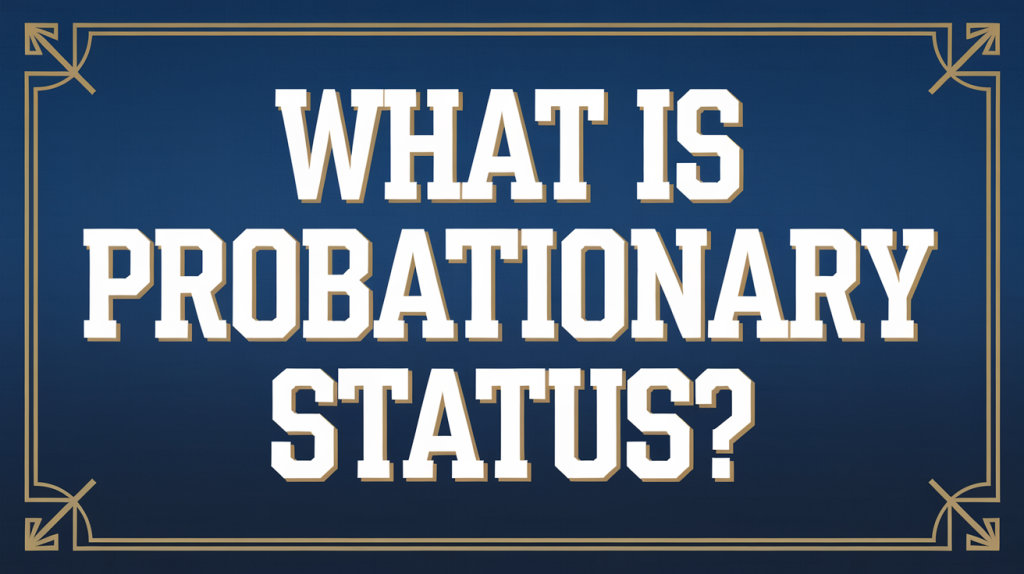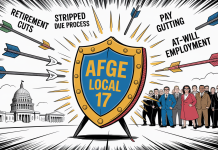Probationary Status and Telework Under Threat
Federal employees face many uncertainties in today’s political and workplace climate, but few are more concerning than the challenges facing probationary employees and the ongoing attack on telework provisions. In a recent episode of AFGE Local 17’s live podcast, Local 17 President Doug Massey sat down with labor attorney Bibi Roberts to discuss these pressing issues.
Attorney Bibi Roberts of Roberts Labor Law and Consulting—a firm that has previously secured major arbitration victories for Local 17 members—provided valuable insights into the legal landscape surrounding probationary terminations, employees’ rights, and what federal workers can do to protect themselves.
Additionally, Doug Massey addressed the White House’s push to reduce or eliminate telework, the union’s ongoing arbitration against the VA’s 50% in-office requirement, and what members can do to fight back.
If you missed the discussion, here are the key takeaways from the podcast.
Missed the Live Stream? Listen to the Podcast on Spotify!
Table of Contents
Understanding Probationary Status: What You Need to Know

Probationary employees—those in their first one to two years of federal service—face significant vulnerability because their termination requires far less due process than that of permanent employees. However, Bibi Roberts outlined several critical exceptions to this general rule.
When Can a Probationary Employee Be Fired?
While agencies often claim probationary employees can be fired for “any reason or no reason,” Roberts clarified that this is not entirely true. Agencies cannot fire probationary employees if:
- The termination is based on an illegal reason, such as discrimination (race, sex, age, disability, etc.)
- The termination is due to whistleblower retaliation
- The employee engaged in protected union activity
- The termination is based on pre-employment misrepresentations (which have specific due process protections)
Additionally, some probationary employees may already qualify as permanent employees without realizing it, depending on their prior federal service and how their time is counted.
How to Determine If You’re a Probationary Employee
To determine if you are still in a probationary period, check:
- Your SF-50 form (Box 34 for service type and Box 26 for veteran preference status)
- The start date of your current position
- Any leave without pay (LWOP) periods that might extend your probation
If you’ve already completed one year of continuous service in a competitive service position—or two years in an accepted service position—you may already have full due process and appeal rights.
What Can Probationary Employees Do?
- Seek Union Assistance Early – Local 17 routinely intervenes to prevent terminations by working with supervisors before a decision is finalized.
- Understand Your Rights – If you suspect your termination is illegal, you may have recourse through the EEOC, MSPB, or the Federal Labor Relations Authority.
- Check Your Status – Some employees may mistakenly be treated as probationary when they actually have full employment protections.
For those facing potential termination, acting quickly is key—securing legal advice or contacting the union can make a difference.
The Fight to Protect Telework: What’s at Stake?
Another major topic covered in the podcast was the ongoing attack on federal telework policies. Since the pandemic, telework has proven its value, increasing productivity and improving work-life balance. However, the current administration has made it clear that it intends to drastically reduce or eliminate telework across federal agencies.
What’s the Government’s Endgame?
Doug Massey described the strategy as “making federal employees as miserable as possible” in the hopes that many will quit voluntarily. By cutting telework, forcing long commutes, and maintaining poor office conditions, the administration aims to shrink the federal workforce without outright mass firings.
The administration has requested lists of probationary employees and those with performance issues, fueling fears that these workers may be targeted first.
What Is Local 17 Doing to Fight Back?
- Arbitration Against the VA – Local 17 has already filed a grievance against the VA’s 50% in-office attendance requirement, which violates the union’s negotiated telework agreement.
- Preparing for Legal Action – If the VA attempts to eliminate telework entirely, the union will file additional grievances and pursue arbitration.
- Building Political Pressure – The union is urging employees to contact their Congressional representatives, especially those outside of the D.C. area, to stress the importance of telework.
Why This Fight Matters
- Telework boosts productivity – Employees often start earlier and work longer hours.
- It reduces costs – Less commuting saves employees and the government money.
- It helps retention – Agencies like VA, which already struggle with high attrition, will lose valuable workers if telework is eliminated.
Massey emphasized that telework restrictions are politically motivated rather than performance-based, stating:
“This isn’t about productivity. It’s about making life so miserable that people quit.”
What Can You Do?
- Stay Informed – Follow Local 17’s updates on ongoing legal battles and arbitration results.
- Contact Congress – Employees nationwide need to tell their representatives that telework is essential.
- Engage with the Union – If you’re a probationary employee facing issues, reach out before it’s too late.
For those who missed the podcast, Local 17 will be posting a Frequently Asked Questions (FAQ) section on its website later this week, addressing concerns raised during the discussion.
Final Thoughts: Solidarity Matters
The podcast ended with a strong message of solidarity and perseverance. While the current climate is challenging, federal employees are not alone. The union is fighting back—through legal action, advocacy, and direct engagement with agency leadership.
Massey reminded listeners:
“We didn’t join the VA for fame or money. We’re here to serve veterans, and we deserve to be treated with respect.”
If you’re concerned about probationary status, telework, or other workplace issues, AFGE Local 17 is here to support you.
- Stay tuned for our next live podcast on February 26th, where we’ll be discussing reasonable accommodations and employees’ rights under the ADA.
- Have questions? Need assistance?
- Reach out to AFGE Local 17 and let us help you navigate these challenges.
FAQs From the Live Stream
We are still working on the answers to your questions from the Live Stream. We hope to have them posted here very soon so check back in a little bit!
Telework & Remote Work
- Can you explain the differences between telework (duty station = agency address) and remote work (duty station = home address), and how these differ in the union agreement? How do these apply to Return-to-Office (RTO) orders?
- OPM guidance has used “telework” and “remote work” interchangeably. The AFGE Master Collective Bargaining Agreement does not expressly distinguish between teleworkers and remote workers but limits the reasons that employees can be removed from telework. AFGE will take legal action to protect the rights of both teleworking and remote bargaining unit employees under the Master Agreement and Telework Enhancement Act.
- Can the telework arbitration against the previous Secretary apply to current Executive Orders, or would a new lawsuit have to be filed?
- Local 17 is exploring all litigation options regarding to management’s unilateral changes to telework schedules under the current and prior administrations.
- Did I hear you say that writing Congress about advocating to preserve our telework is suggested?
- Federal employees have a right to to share their personal stories and opinions with their elected representatives.
- For individuals hired as remote employees (years before COVID), is there any recourse if, as part of RTO, their job is reclassified and their duty station changed from their home to an office in DC?
- Certain employees, including military spouses and those with reasonable accommodations, have been exempted from the return to office mandate. The Union is awaiting more guidance from the Department regarding remote employees. The Union encourages employees to comply with any directives from their supervisor regarding telework, but to document these orders and request them in writing.
Probationary Status & MSPB Appeals
- Does that mean that Board attorneys all have a 2-year probationary period, even though the Board tends to operate like it’s 1 year?
- To have full due process rights, including MSPB appeal rights, employees must meet the definition of “employee” in 5 USC 7511. Excepted service personnel, like attorneys, must typically serve a 2-year trial period.
- Could you please explain excepted service non-preference attorney advisor positions who were told they would have a 1-year probationary period? It sounded like it is always 2 years?
- To have full due process rights, including MSPB appeal rights, employees must meet the definition of “employee” in 5 USC 7511. Excepted service personnel, like attorneys, must typically serve a 2-year trial period. Non-preference eiligible attorneys without prior federal service will not typically have MSPB appeal rights until completing two years of federal service, despite their SF 50 reflecting a 1-year probationary period.
- Even if we’re an 8888? (no context added)
- Employees who are coded as 8888 in box 37 of their SF 50 have been excluded from being a part of a bargaining unit, for example supervisors and HR personnel have been excluded. If you think this might be an error, reach out to Local 17.
- If the SF-50 does not reflect Veterans’ preference, but the employee submitted a preference eligibility letter in the application process, should the employee look into having their SF-50 updated?
- Yes, check your SF 50 for errors, including if prior military service has not been correctly reflected.
Legal Challenges & Employee Rights
- Since Judge O’Toole has said the FLRA or the MSPB is the correct path to engage and there is no block to the Dispute Resolution Process (DRP), what will happen next? How long will it take?
- The Federal Court ruled it did not have subject matter jurisdiction to rule on the legality of the Deferred Resignation Program. Individual agencies should provide guidance regarding the program. The AFGE National VA Council has filed two national grievances regarding the Deferred Resignation Program and how it impacts AFGE BUEs at VA.
- Where do you go when MSPB and EEOC offices are being stripped of personnel?
- MSPB and EEOC are both still operational and accepting appeals, although there could be significant delays dues to case backlogs at those agencies.
- Is it possible for the new Secretary to rescind the Special Salary Rate for 2210 IT employees?
- The Union has no information regarding the recission of any Special Salary Rates for series 2210 or other IT Professionals.
Frequently Asked Questions (FAQ) – AFGE National
AFGE National has put together a detailed FAQ document addressing the rights of probationary employees. This guide covers essential topics such as probationary periods, termination procedures, MSPB appeal rights, union grievances, and protections against unlawful discrimination.
📥 Download the full FAQ document here: AFGE National FAQ Document
Below is a transcription of the FAQs for reference:
Frequently Asked Questions on the Rights of Probationary Employees
- What is a probationary employee?
- Generally speaking, a probationary employee is an employee who is still serving a probationary or trial period following their appointment to a position.
- The probationary period in the competitive service is one year (5 C.F.R. § 801(a); 5 U.S.C. § 7511(a)(1)(A)).
- The probationary period for preference-eligible employees in the excepted service is one year (5 U.S.C. § 7511(a)(1)(B)).
- The probationary period for non-preference eligible employees in the excepted service is two years (5 U.S.C. § 7511(a)(1)(C)).
- When do employees acquire full adverse action appeal rights for MSPB appeals and union grievances?
- Competitive Service: Employees acquire full rights after completing their probationary period or after one year of current continuous service under a non-temporary appointment.
- Excepted Service:
- Preference-eligible employees gain appeal rights after completing one year of continuous service in the same or similar position.
- Non-preference eligible employees gain rights after either completing their probationary period or two years of continuous service in the same or similar position.
- When can agencies terminate probationary employees?
- Agencies may terminate a probationary employee at any time during the probationary period.
- Federal regulations require termination if an employee “fails to demonstrate fully his or her qualifications for continued employment” (5 C.F.R. § 315.803(a)).
- What is the process for terminating probationary employees?
- Performance or Conduct-Based Terminations: The agency must provide written notice of the reasons and the effective date of termination, but the employee does not have a right to respond before removal (5 C.F.R. § 315.804).
- Pre-Employment Conduct Terminations: Employees must receive advanced notice, a chance to respond, and a written decision explaining the termination and appeal rights (5 C.F.R. § 315.805).
- What MSPB appeal rights do terminated probationary employees have?
- Competitive service probationary employees may appeal only if they allege termination was based on:
- Partisan political reasons or marital status (5 C.F.R. § 315.806(b)).
- Pre-employment reasons that violated procedural requirements (5 C.F.R. § 315.806(c)).
- Unlawful discrimination, but only if combined with a claim of partisan political reasons, marital status discrimination, or procedural deficiency (5 C.F.R. § 315.806(d)).
- Excepted service probationary employees generally cannot appeal their removal to the MSPB (5 U.S.C. § 1201.3(a)(3)).
- Competitive service probationary employees may appeal only if they allege termination was based on:
- What Equal Employment Opportunity (EEO) rights do probationary employees have?
- Probationary employees cannot be removed based on unlawful discrimination (race, color, religion, sex, age, disability, national origin, or retaliation for protected activity).
- Employees can file an EEO complaint if they believe they were terminated based on discrimination, but EEOC rarely overturns removals.
- Can probationary employees file a complaint with the Office of Special Counsel (OSC) to challenge their termination?
- Yes, employees may file an OSC complaint if they believe their termination was a prohibited personnel practice (e.g., whistleblower retaliation).
- If OSC finds merit in the case, they can request the MSPB to stay the removal. However, OSC complaints do not guarantee MSPB review.
- Can probationary employees or their unions file a grievance over removal?
- Many collective bargaining agreements (CBAs) exclude probationary removals from the grievance process.
- If a union does file a grievance, it is usually limited to cases where termination was based on union animus (i.e., anti-union retaliation).
- Can probationary employees or their unions file an unfair labor practice (ULP) charge with the FLRA to challenge a probationary removal?
- Yes, but only if there is clear evidence that the termination was based on union animus (anti-union bias).
📌 Important Note: This FAQ is for informational purposes only and does not guarantee specific legal outcomes. Employees facing termination should seek individualized legal or union advice.




